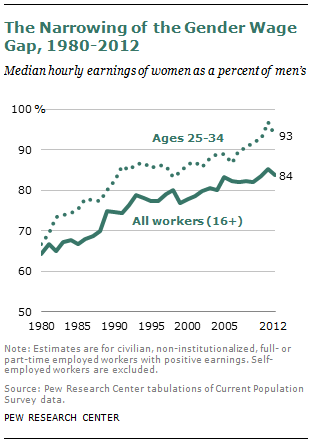Payroll
Pay Gap for Women in Workplace Narrows
Young women seem closer than ever to achieving gender equality in the workplace, at least when it comes to wages, a new report from the Pew Research Center suggests. But it remains to be seen whether motherhood will slow their strides, as it did for women before them.
Dec. 11, 2013

According to a new report from the Pew Research Center, the payroll gap between women and men in the workplace is narrowing, mostly due to the increase in young professional women over the past decade.
Members of the Millennial generation, these women are often better educated, overall, than their predecessors and also compared to their young male coworkers, the report says. However, many still see challenges in their future based on their gender: “They believe that women are paid less than men for doing the same job. They think it’s easier for men to get top executive jobs than it is for women. And they assume that if and when they have children, it will be harder for them to advance in their careers.”
While the public sees greater workplace equality between men and women now than it did 20 to 30 years ago, most believe more change is needed. Among Millennial women, 75% say this country needs to continue making changes to achieve gender equality in the workplace, compared with 57% of Millennial men. Even so, relatively few young women (15%) say they have been discriminated against at work because of their gender.
As Millennial women come of age in the “lean in” they share many of the same views and values about work as their male counterparts. They want a job they enjoy that provides security and flexibility, and they place relatively little importance on high pay. At the same time, however, young working women are less likely than men to aspire to top management jobs: 34% say they are not interested in becoming a boss or top manager; only 24% of young men say the same. The gender gap on this question is even wider among working adults in their 30s and 40s, the age at which many women face the trade-offs that go with work and motherhood.
These findings are based on a new Pew Research Center survey of 2,002 adults, including 810 Millennials (adults ages 18 to 32), conducted Oct. 7-27, 2013. The survey finds that, in spite of the dramatic gains women have made in educational attainment and labor force participation in recent decades, young women view this as a man’s world—just as middle-aged and older women do. Roughly half of Millennial women (51%) and their older counterparts (55%) say society favors men over women; just 6% of both groups say it favors women over men.
The survey findings are paired with a Pew Research analysis of census data that shows that today’s young women are the first in modern history to start their work lives at near parity with men. In 2012, among workers ages 25 to 34, women’s hourly earnings were 93% those of men. By comparison, among all working men and women ages 16 and older, women’s hourly wages were 84% those of men. And women in the younger age cohort were significantly more likely than their male counterparts to have completed a bachelor’s degree—38% versus 31% in 2013.
Yet there is no guarantee that today’s young women will sustain their near parity with men in earnings in the years to come. Recent cohorts of young women have fallen further behind their same-aged male counterparts as they have aged and dealt with the responsibilities of parenthood and family. For women, marriage and motherhood are both associated with less time spent on paid work-related activities. For men, the onset of family responsibilities has a reverse effect on their career.
The new Pew Research survey finds that among working parents of all ages with children younger than 18, mothers are three times as likely as fathers to say that being a working parent has made it harder for them to advance in their job or career (51% vs. 16%).
The survey also finds that women are much more likely than men to experience family-related career interruptions. Among mothers of children under age 18 who have ever worked, 51% say they have taken a significant amount of time off from work to care for a child or family member. This compares with only 16% of working fathers with children under age 18.
Women who have experienced a significant career interruption in order to care for a family member have few regrets. They overwhelmingly say they are glad they did this, even though a significant share say it hurt their career overall.
For their part, young women today who have not yet had children expect that when they do, the impact on their careers will be negative. Among those ages 18 to 32, 63% think that having children will make it harder for them to advance in their job or career.
